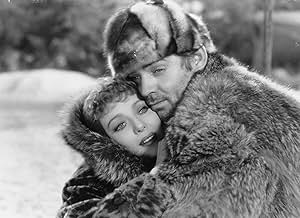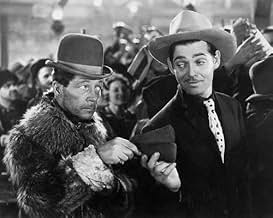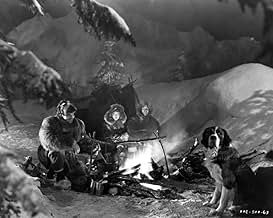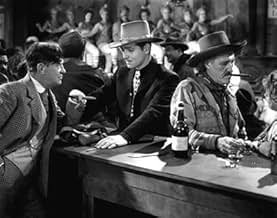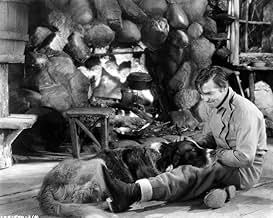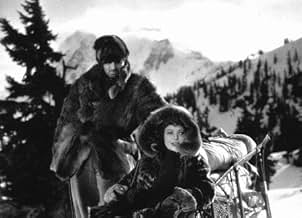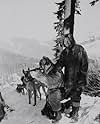IMDb RATING
6.8/10
2.8K
YOUR RATING
During the Klondike Gold Rush, a traveler purchases a dog to lead the way toward the treasure, but reconsiders his journey when he finds a stranded widow.During the Klondike Gold Rush, a traveler purchases a dog to lead the way toward the treasure, but reconsiders his journey when he finds a stranded widow.During the Klondike Gold Rush, a traveler purchases a dog to lead the way toward the treasure, but reconsiders his journey when he finds a stranded widow.
- Director
- Writers
- Stars
- Awards
- 1 win total
Thomas E. Jackson
- 'Tex' Rickard
- (as Tommy Jackson)
George MacQuarrie
- Mounted Policeman
- (as George McQuarrie)
C.E. Anderson
- Fourth Poker Player
- (uncredited)
Edwin Argus
- Dawson Townsman
- (uncredited)
William Arnold
- First Faro Player
- (uncredited)
- Director
- Writers
- All cast & crew
- Production, box office & more at IMDbPro
Featured reviews
Jack London's novel The Call Of The Wild is pretty much ignored in this 1935 adaptation. The title remains the same and there IS a dog named Buck involved in parts of the action, but apart from that the similarities are virtually non-existent. Far greater emphasis is placed on the human characters in the film than in the book. One has to assume that the film was written as a vehicle for Clark Gable, a big outdoor adventure yarn in which the star could get in to and out of a variety of hair-raising escapades in the frozen wilderness. The fact that London's novel is essentially an animal story with a few human characters passing through the narrative is of little significance to scripter Gene Fowler and director William Wellman. That's not to say The Call Of The Wild is a disposable film; the unusual and expensive decision to film on genuinely cold, mountainous locations (Washington state standing in for Yukon) shows that this was envisaged as a serious box office winner.
Struggling gold prospector Jack Thornton (Gable) and his goofy sidekick Shorty Hooliham (Jack Oakie) travel around the Yukon in the 19th Century, searching for an elusive gold strike that will make them richer than rich. They are helped in their adventures by a St Bernard dog named Buck. Also busily scouring the land for gold is the sinister English-man Smith (Reginald Owen), a cruel rival who has a mysterious past and even a little history with Thornton's dog. During their wanderings, Jack and Shorty come across a woman called Claire Blake (Loretta Young) whose husband has gone missing in the snowfields and could be dead. Claire teams up with Jack, Shorty and Buck, but it isn't long before she finds herself falling for Thornton's roguish charm, even though she cannot be sure if her husband is dead or alive.
The movie is very enjoyable in its old-fashioned way. I'm a believer in the theory that films should try to be faithful to their source material, at least to a reasonable extent, so in some ways I felt dismayed at the lack of respect towards London's original story. However, once I'd got that small irritation out of my system I found The Call Of The Wild a perfectly likable star vehicle. Gable is solid in a role that asks little of him other than to appear rugged and fearless. Owen is very good as the villain of the piece, while Young shares a good chemistry with the hero (in real-life, she and Gable were lovers). Jack Oakie is the least impressive of the key actors, mugging rather embarrassingly as the inevitable comical sidekick. The location work in Washington state adds a sense of authenticity to the film that is very uncommon for a movie made in the studio-bound '30s. On the negative side, though, the film settles for a very convenient ending which ditches plausibility so that the course of true love and personal success can run smoothly (indeed, IMPROBABLY smoothly) for the main protagonists. Of its type and era, however, The Call Of The Wild is watchable and entertaining fare.
Struggling gold prospector Jack Thornton (Gable) and his goofy sidekick Shorty Hooliham (Jack Oakie) travel around the Yukon in the 19th Century, searching for an elusive gold strike that will make them richer than rich. They are helped in their adventures by a St Bernard dog named Buck. Also busily scouring the land for gold is the sinister English-man Smith (Reginald Owen), a cruel rival who has a mysterious past and even a little history with Thornton's dog. During their wanderings, Jack and Shorty come across a woman called Claire Blake (Loretta Young) whose husband has gone missing in the snowfields and could be dead. Claire teams up with Jack, Shorty and Buck, but it isn't long before she finds herself falling for Thornton's roguish charm, even though she cannot be sure if her husband is dead or alive.
The movie is very enjoyable in its old-fashioned way. I'm a believer in the theory that films should try to be faithful to their source material, at least to a reasonable extent, so in some ways I felt dismayed at the lack of respect towards London's original story. However, once I'd got that small irritation out of my system I found The Call Of The Wild a perfectly likable star vehicle. Gable is solid in a role that asks little of him other than to appear rugged and fearless. Owen is very good as the villain of the piece, while Young shares a good chemistry with the hero (in real-life, she and Gable were lovers). Jack Oakie is the least impressive of the key actors, mugging rather embarrassingly as the inevitable comical sidekick. The location work in Washington state adds a sense of authenticity to the film that is very uncommon for a movie made in the studio-bound '30s. On the negative side, though, the film settles for a very convenient ending which ditches plausibility so that the course of true love and personal success can run smoothly (indeed, IMPROBABLY smoothly) for the main protagonists. Of its type and era, however, The Call Of The Wild is watchable and entertaining fare.
The Yukon Gold Rush: A savage dog and a lonely man each respond to THE CALL OF THE WILD, that primordial release of primitive urges, in their own way.
It should be understood immediately that this movie only borrows the title and a few incidents from Jack London's classic novel. And at that point the comparison between the two should end. This film, rousing & adventurous, is able to stand on its own merits. An excellent cast, fine production values (notice particularly the care with which Skagway & Dawson are depicted) and location shooting in Washington State are the film's strongest assets. The plot, meant solely for entertainment, is pure hokum...
Clark Gable brings his trademark masculinity to a role that didn't require a lot of stretching of his thespian muscles. But in essentially playing himself he is perfectly cast. One cannot overcome the suspicion that London's original story was reworked for the star. Gable had been through this before - remote setting, forces of nature, beautiful woman, adultery. Think RED DUST in the snow.
Loretta Young is the beautiful woman. From scene to scene, no matter what the hardship, she remains living proof that a first class Hollywood makeup job can withstand the worst ravages of the Klondike. This is perhaps too harsh. Like Gable, little more is required of her than to exude physicality. She is indeed a treat to the eyes, even if her inclusion in the plot is patently ludicrous. (The on screen attraction between Gable & Young wasn't faked. A daughter, ostensibly 'adopted' by Young in France, would be the result.)
As Gable's sidekick, comic Jack Oakie has one of his best screen roles. Getting to play most of his scenes strictly for laughs, he adds chuckles to the story which, one assumes, would have outraged London.
Twisting his usual pomposity to a sinister bent, English character actor Reginald Owen is memorable as the film's villain. Dangerously wicked, he makes us want to know more about this man called Smith, with money to burn and a raging temper. The screenplay, wisely, leaves his biography up to the imagination of the viewer.
Sidney Toler & Herman Bing are very good in small roles. Movie mavens will recognize Arthur Housman, veteran of many Laurel & Hardy comedy shorts, as a Skagway drunk with a surprisingly mean punch.
The affection between Gable and Buck, the great St. Bernard with whom he shares so many scenes, is obvious.
It should be understood immediately that this movie only borrows the title and a few incidents from Jack London's classic novel. And at that point the comparison between the two should end. This film, rousing & adventurous, is able to stand on its own merits. An excellent cast, fine production values (notice particularly the care with which Skagway & Dawson are depicted) and location shooting in Washington State are the film's strongest assets. The plot, meant solely for entertainment, is pure hokum...
Clark Gable brings his trademark masculinity to a role that didn't require a lot of stretching of his thespian muscles. But in essentially playing himself he is perfectly cast. One cannot overcome the suspicion that London's original story was reworked for the star. Gable had been through this before - remote setting, forces of nature, beautiful woman, adultery. Think RED DUST in the snow.
Loretta Young is the beautiful woman. From scene to scene, no matter what the hardship, she remains living proof that a first class Hollywood makeup job can withstand the worst ravages of the Klondike. This is perhaps too harsh. Like Gable, little more is required of her than to exude physicality. She is indeed a treat to the eyes, even if her inclusion in the plot is patently ludicrous. (The on screen attraction between Gable & Young wasn't faked. A daughter, ostensibly 'adopted' by Young in France, would be the result.)
As Gable's sidekick, comic Jack Oakie has one of his best screen roles. Getting to play most of his scenes strictly for laughs, he adds chuckles to the story which, one assumes, would have outraged London.
Twisting his usual pomposity to a sinister bent, English character actor Reginald Owen is memorable as the film's villain. Dangerously wicked, he makes us want to know more about this man called Smith, with money to burn and a raging temper. The screenplay, wisely, leaves his biography up to the imagination of the viewer.
Sidney Toler & Herman Bing are very good in small roles. Movie mavens will recognize Arthur Housman, veteran of many Laurel & Hardy comedy shorts, as a Skagway drunk with a surprisingly mean punch.
The affection between Gable and Buck, the great St. Bernard with whom he shares so many scenes, is obvious.
Clark Gable meets Loretta Young in this 1930s adaptation of Jack London's The Call of the Wild, which takes place in Alaskan territory. I've never read the book, but I can only imagine that this was probably not very faithful to the novel, due to its emphasis of comic relief by supporting actor Jack Oakie. This is the movie that changed Clark and Loretta's life, as they fell in love during the making of this film, and she went away in private to have his baby - a fact she never told the public. While that may be neither here nor there, in reviewing this film, it's pretty evident that something was going on, by their quiet scenes together, which are very intimate and deep, considering this is a 1930s film. The plot revolves around a map that is needed to find a gold mine. Her husband, yes her husband, was the owner of the map, but Clark and Jack go after the gold mine, with Jack's memory and a rough sketch of it to use. They find Loretta alone, after her husband has been lost in the wilderness looking for help. Reginald Owen is very good and memorable as a nemesis in trying to find the gold mine too, when he learns of it. The production values and performances are solid and deliver the goods, but its corny comic relief mars the film's attempt to hit the mark with viewers, especially with its abrupt ending. I thought the novel was mainly about the dog, but, while the dog, who Clark is attached to, does have some screen time, the film doesn't feel like a dog film. The producers were probably thinking that would alienate some viewers, so they centered on pairing attractive leads Clark and Loretta together and Jack Oakie's one-liners. While I liked the film on the whole for Loretta's loveliness, memorable love scenes between her and Clark, and Reginald Owen's credible contribution to the film, I still feel it misses the mark for a completely fulfilling movie experience.
Gable has it all for a short while: easy pickings gold nuggets, a gorgeous girlfriend he found in the wilderness, a half-wild soul mate lead dog and a bashful wisecracking partner. But, his grasp on all of these is slippery, as the plot develops. I don't fault Hollywood for departing so flagrantly from London's story, which too was just a yarn. I found this version much more entertaining and profound, despite the stereotypical boss-sidekick relationship between Gable and Jack Oakie.
Gable seems to represent sort of an ideal adventurous entrepreneur: a riverboat gambler at heart, who is willing to take big risks and to work for his fortune when necessary, but who tries to grab all he can and beat out the competition. The chief villain is a stereotypical pretentious cutthroat tycoon: the worst kind of capitalist. In contrast, Gable recognizes certain limits in gaining his fortune and honors his commitments to his partners, be they human or animal. Loretta's creed is yet more tempered: You will get what you want only if you deserve it. See the movie to find out how these various creeds interact to determine the outcome.
This is perhaps Gable's most enjoyable role, along with those in "Mutiny on the Bounty" and "Boom Town". As in most of his best roles, Gable comes across as rakish: part hero, part scoundrel, but never dull. Like Gable, Loretta is at her physical peak at this time, making for a very romantic-looking couple.
Gable seems to represent sort of an ideal adventurous entrepreneur: a riverboat gambler at heart, who is willing to take big risks and to work for his fortune when necessary, but who tries to grab all he can and beat out the competition. The chief villain is a stereotypical pretentious cutthroat tycoon: the worst kind of capitalist. In contrast, Gable recognizes certain limits in gaining his fortune and honors his commitments to his partners, be they human or animal. Loretta's creed is yet more tempered: You will get what you want only if you deserve it. See the movie to find out how these various creeds interact to determine the outcome.
This is perhaps Gable's most enjoyable role, along with those in "Mutiny on the Bounty" and "Boom Town". As in most of his best roles, Gable comes across as rakish: part hero, part scoundrel, but never dull. Like Gable, Loretta is at her physical peak at this time, making for a very romantic-looking couple.
This is my first exposure to anything regarding THE CALL OF THE WILD. Meaning that I haven't read Jack London's original novel, never saw any of the earlier film versions, and did not see any of the later remakes. Even as a Charlton Heston fan I've so far avoided his 1972 edition because it's said to be pretty bad; even Heston begged his fans not to see it! But all that may soon change, as I enjoyed the 1935 version, starring Clark Gable and Loretta Young.
Gable is well cast as Jack Thornton, a rugged and adventurous type who travels the Yukon on a hunt for gold with the aid of his comical sidekick Shorty (Jack Oakie) and man's best friend, Buck the dog. In the midst of their quest they stumble upon a shaken woman (Young) whose husband has disappeared in the wilderness and may or may not be dead. Fearing the worst, Young joins the expedition and the expected romance with Gable gradually takes shape.
For me, one of the highlights of the picture was British actor Reginald Owen who scores high with his portrayal of a nasty rich man who's also competing with Gable for the loot. Never short on snobbish insults, and harboring a personal vendetta against Thornton's dog Buck, Owen is a delight in every scene he's in. The same cannot necessarily be said for Jack Oakie, however... as Shorty, his goofy shenanigans sometimes verge on the overbearing.
A nice mixture of adventure, villainy, romance, and some comedy that occasionally works, makes for a mostly good time. I was a little let down by the convenient ending. *** out of ****
Gable is well cast as Jack Thornton, a rugged and adventurous type who travels the Yukon on a hunt for gold with the aid of his comical sidekick Shorty (Jack Oakie) and man's best friend, Buck the dog. In the midst of their quest they stumble upon a shaken woman (Young) whose husband has disappeared in the wilderness and may or may not be dead. Fearing the worst, Young joins the expedition and the expected romance with Gable gradually takes shape.
For me, one of the highlights of the picture was British actor Reginald Owen who scores high with his portrayal of a nasty rich man who's also competing with Gable for the loot. Never short on snobbish insults, and harboring a personal vendetta against Thornton's dog Buck, Owen is a delight in every scene he's in. The same cannot necessarily be said for Jack Oakie, however... as Shorty, his goofy shenanigans sometimes verge on the overbearing.
A nice mixture of adventure, villainy, romance, and some comedy that occasionally works, makes for a mostly good time. I was a little let down by the convenient ending. *** out of ****
Did you know
- TriviaLike many films of the era, this production was originally slated to film in the Southern Sierra Nevada near Sonora. In fact, production had already begun when a warm front melted the snow and forced a hasty and expensive move to Washington state.
- GoofsWhy call this a goof? It's just a funny way of saying he'd knife someone.
- Quotes
Jack Thornton: Me? I'll take bourbon. It kills you slower, but a lot more pleasant like.
- Alternate versionsOriginally released at 95 minutes; later cut to 81 minutes for a re-issue. For many years only the cut re-issue version was available for television showings, and it is also the version released on DVD in 2006 as part of the Clark Gable Collection. The original length version remained unseen until it was released on blu-ray in 2013.
- ConnectionsFeatured in Only the Lonely (1991)
- How long is Call of the Wild?Powered by Alexa
Details
- Runtime
- 1h 35m(95 min)
- Color
- Sound mix
- Aspect ratio
- 1.37 : 1
Contribute to this page
Suggest an edit or add missing content


